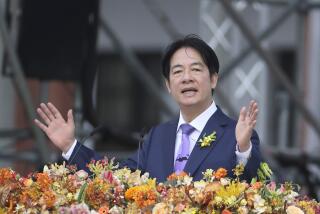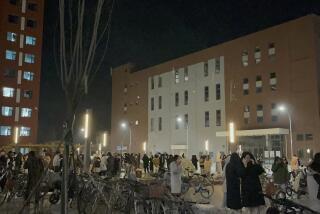China eager to show it can handle Games amid crisis
BEIJING — Amid a massive relief and reconstruction effort pulling resources to central China’s earthquake-ravaged Sichuan province, Chinese officials said preparations for the Summer Olympics remain on track.
Euphoria for the August Games has understandably been overshadowed by the devastating magnitude 7.9 temblor that resulted in more than 67,000 deaths and left millions homeless. Chinese officials are now eager to show the world that they are capable of handling the massive humanitarian crisis and the Olympics at the same time.
“The preparations for the Olympic Games have moved into the last and critical stage,” Chinese Vice President Xi Jin- ping told state news media this week during a visit to sporting venues getting their finishing touches.
“We will do it well while working hard for quake relief,” Xi said. “We will pay equal importance to the two things and not delay one for the other.”
Also of concern to the Chinese government is the possibility of a SARS-like epidemic or food safety scare. Such crises in recent years have undermined public confidence and thrown into question Beijing’s willingness to provide accurate, up-to-date information in the event of an emergency.
Health officials say they learned a great deal from their initial cover-up of the outbreak of severe acute respiratory syndrome in 2003. They also learned positive lessons, they say, from the government’s unprecedented openness and effectiveness in responding to the earthquake this month.
“We must put people’s lives first,” Jin Dapeng, party secretary of the Beijing Municipal Health Bureau, said Wednesday. “We must provide open, transparent and fair information. That’s the government’s responsibility.”
In the national outpouring of support for quake victims, the Chinese capital was able to quickly mobilize and dispatch emergency medical teams. Officials said the disaster offered a rare opportunity for the Olympic host to practice its crisis management skills.
“The earthquake was like a test to us,” Jin said. “Our medical staff did an exceptional job in the relief effort. It gave us more confidence about holding a successful Olympics.”
Officials provided few details on how the government would deal with a bioterrorism attack or other situations necessitating mass evacuations during the Games. But they continued to show great concern about the possibility of bad weather.
On Tuesday, China launched a second weather-forecasting satellite to better monitor conditions during the Games.
But despite claims that it would improve Beijing’s air quality, the Chinese capital has been choked by the fourth severe sandstorm of the year and its skyline has been shrouded in brown haze for days as authorities urged the elderly and children to stay indoors.
Health officials acknowledge that the environment is a major problem but try to downplay its effect on the Games, saying they can provide the best doctors possible to help any visitor or athlete with breathing problems.
“Maybe older people and children are more vulnerable,” said Zhao Tao, head of the Beijing health bureau’s disease prevention and control division. “But I don’t see a direct connection between weather conditions and contagious diseases.”
--
More to Read
Sign up for Essential California
The most important California stories and recommendations in your inbox every morning.
You may occasionally receive promotional content from the Los Angeles Times.










